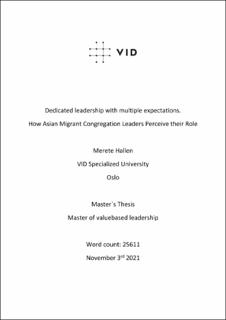| dc.description.abstract | There is in general little knowledge about migrant congregation leaders in the Norwegian society, including as the field of research. This study seeks to fill a small part of this gap by looking at migrant pastors and how they understand their leadership. My overarching research question is “What perception do leaders of migrant congregations have of their own role as a leader?”. I also have three related sub questions which are: “How do they understand their leadership roles?”, “What do they regard as the greatest challenges?”, and “What strategies do they apply to solve them?”.
To answer these questions, I have chosen a qualitative methodological approach with a hermeneutical theory of science approach. I used open in-depth interviews of six Asian migrant congregation leaders to collect the empirical data. I chose an abductive approach for the analyses, going back and forth between my empirical data, Askeland’s model of leader roles (2015), and theoretical perspectives of intercultural leadership.
Topics that emerged from the data is presented as topical stories presenting the informants, and thematical presentations of four main findings under these titles: (1) Leaders with responsibility and authority, (2) Communication, community, and change, (3) Integration, and finally (4) Transnationality as leadership context. I found that the Asian migrant congregation leaders are inner motivated and dedicated leaders with multiple expectations. They cooperate with congregation members and are involved in various tasks, both spiritually and managerially, and they face challenges which they find strategies on how to solve. The responsibilities they have are very comprehensive.
I analyzed their leadership looking at the importance of communication and the challenges of language and cultural differences. I looked at different aspects of integration, and how the pastors regarded it as part of their role to lead integration processes. Finally, I looked at all the different aspects of their leadership which can be described as holistic including both spiritual, relational and managerial leader roles. The relational responsibilities are emphasized, while the spiritual aspect is regarded as the most important. Also, their leadership must be adapted to migrant congregations which are organizations in constant IV change. Holding all these aspects together, the Asian migrant congregation leaders can best be described as overall responsible leaders. | en_US |
